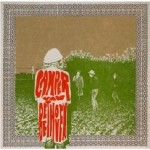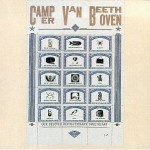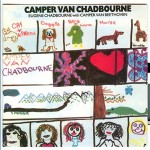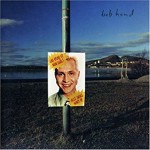Multi-instrumentalist Jonathan Segel is a founding member of the eclectic alternative rock band Camper Van Beethoven. The band’s first album Telephone Free Landslide Victory, which came out in 1985, includes such classic songs as “The Day That Lassie Went to the Moon”, “Where the Hell is Bill?”, the Black Flag cover “Wasted”, and “Take the Skinheads Bowling”. He also appeared on the independently-released II & III and self-titled Camper Van Beethoven, and on the band’s major-label debut Our Beloved Revolutionary Sweetheart. Segel has been back with the band since they reformed at the end of the end of the 1990’s, including on their most recent album, 2014’s El Camino Real. Segel has also played with many other bands and artists including Sparklehorse and Eugene Chadbourne.
This interview was for a preview article for the Camper Van Beethoven concert at the Lobero Theatre in Santa Barbara on 12/28/16. It was done by email, with answers received 12/14/16.
Jeff Moehlis: I want to start out by saying that I work at UC Santa Barbara, and live in Goleta. With that in mind, would you like to apologize for the Camper Van Beethoven song “(Don’t You Go To) Goleta”?
Jonathan Segel: Well, would you be then apologizing for the student behavior in the 1980s…? I mean, given that this inane parodic ditty was put on record in late 1985 and we were a nascent touring band coming from Northern California – and Santa Cruz, at that – what it is skewering is the clueless acceptance of Reagan-era “America the great” among the youth of the era. While I’m certain that trickle-up/down economics worked out well for some of the then-UCSB students, it didn’t do so well overall for our country, now did it? How’s that infrastructure rebuild going? How are your students these days?
JM: Will that song be on the setlist for your show in Santa Barbara? And what (else) can people look forward to at your upcoming concert?
JS: Well, no. I don’t know if we’ve played it since the 1980’s! I did hear it on a college radio station once long ago while driving, and was shocked by how stupid a song it was (I say as the singer of that particular track.)
But we do play several songs from the albums we made then, as well as those more recent. We’re looking into adapting a setlist from the early 1990’s era with an infusion of [recent albums] El Camino Real and La Costa Perdida, and a touch of New Roman Times.

JM: I’ve enjoyed the evolution of Camper Van Beethoven, but my favorite album is still the first one, Telephone Free Landslide Victory. What are your reflections on that particular album?
JS: It really is an oddity in the world of alternative music. There weren’t that many albums that had instrumentals, for one thing, and that’s a tradition we’ve tried to keep up. Plus it has the combination of surreal lyrics mixed with parody and punk rock. At the time we were performing in punk venues most of the time – the majority of DIY bands at the time were punk rock bands, so we got lumped right in, and that was a fun audience to take that to. There are definitely some gems on the album, and of course, we still play “Take the Skinheads Bowling” every night.
JM: One of the signature elements of CVB is your violin. Can you tell us about the challenges of playing violin in a rock band?
JS: Well, of course amplification versus feedback is tough if you don’t want it to sound like a stupid synthetic electric violin thing. I prefer sounding like the rough scratchy weird instrument that it is. My major problems involve tuning on the loud rock band stage, as you could probably guess (from the way I play), so I keep the tuner on and an eye on it just in case, and then there’s the fact that since it takes one hand to hold the violin and one hand to hold the bow, I have no free hand to take a drink between songs.
JM: How did/do the Camper Van Beethoven songs and arrangements typically come together, or was/is there a typical?
JS: Really it’s different for each song. On the last two records, though, we did get together for several afternoons in a row at my old house in Oakland (before I moved in 2012) and write a ton of stuff together, and David developed the lyrics afterwards out of a lot of the weird things that we talked about.
JM: Any crazy stories that you’re willing to share from the band’s early tours?
JS: My go-to is always the “getting hit on the neck with raw meat” story when playing at the Farm in San Francisco in the mid-80s.
But here’s another good one that I made into a song: Hey Jocelyn

JM: After several independent releases, CVB moved to a major label [Virgin]. What was the major label experience like for you?
JS: Good and bad, of course. I really, really enjoyed working in bigger studios, but I personally had problems with the producer. I think the label could have been more into the band. Of course, they were a little confused about how to market it (which is why “Pictures of Matchstick Men” was the single from Key Lime Pie: we had started recording on Our Beloved Revolutionary Sweetheart, but didn’t finish when they started pestering about using this cover song as a single…)
My impression was always that a label should just tell the world what was cool rather than try to figure it out, but the L.A. showbiz industry had by then created a culture of gleaners that kept looking around trying to figure out what was the next cool thing. So that was tough to navigate as outsiders. Ultimately that led to me being kicked out of the band, you know.

JM: You’ve played quite a bit with Eugene Chadbourne over the years. What has that been like?
JS: I have learned a lot from Eugene, a lot about music of all sorts. We left on a tour of Europe as Camper Van Chadbourne in 1991 the day that the US started the Gulf War. Many other American bands cancelled out of terrorism fear so we had big audiences and we played “American” music, mostly protest music, in American genres: Country, Rock, Folk, Jazz. We moved between all of these in the Eugene Chadbourne world of free-expression and outside timbres, step on the distortion pedal instead of playing notes whenever you need to… but I had to learn a lot of music. And a lot about music, like that the freedom of “free jazz” was the same freedom of “free speech” and the world of civil rights.
I hadn’t played with him for many years, and this past September he played in Stockholm on my birthday. I had just come back from CVB playing at our Camp-Out festival in Pioneertown, and I got to play with him again. I fell right back into it, the ability to follow along his train of thought-style working of song structure and set list. It felt great!
JM: You’ve been living in Sweden for several years now. How has that changed your perspective of the United States and rest of the world?
JS: I moved in 2012 after being fired from Pandora and subsequently losing our house due to inability to pay the mortgage (we had a 10-month-old at the time, wife was home instead of working, her job might have paid just enough for day care…) So without a job, house or health care, we pulled the rip-cord, and were extremely lucky my wife was Swedish. Then, though, we lived with her parents for a year before finding our own apartment—Stockholm is tough, housing wise.
Changed my perspective on the states? Not so much, I was under no illusions about our country. I’ve watched it being taken apart piece by piece as the public allows it to be. It’s sad. I grew up in California, I love it, but it’s becoming impossible for a vast number of people. Here in Sweden, I’m an immigrant, which is difficult in any situation, even one where the locals mostly speak my native language. I’ve spent four years trying to learn the language but at my age I don’t know if it will ever be adequate. Culturally I will always be a Northern Californian. And I want to continue to be, but again: it’s tough being an immigrant, wherever you are or aren’t. Across the street from our apartment is a building that is housing single teenage refugees, mostly from Iraq, Afghanistan or Eritrea. Those kids have it way tougher than me, that’s for sure, and they are mostly thriving. But I have a family!
JM: Swedish contributions to music are quite diverse, from the pop music of ABBA and Max Martin to extreme death metal. Who are your favorite Swedish artists?
JS: Well, let’s look at your list here. You forgot First Aid Kit…? Sweden is very proud of music that is successful, they praise it for its success… more than its music. There are amazing Swedish bands, but I sincerely doubt most people heard of them as most aren’t majorly globally successful.

Here are some of my current favorites:
JM: What are your plans, musical or otherwise, for the near future?
JS: I have a lot going on!
I have been working with the Øresund Space Collective out of Copenhagen for the past few years, recording and mixing albums with and for them. Check out Different Creatures from last year, or the newest Visions Of…
In this same space rock instrumental world, we just released a double CD by Sista Maj, a trio I play with here, called “Series of Nested Universes” – it’s definitely late night stoner music. I mean, despite the fact that pot is way illegal here!
In February, my next enormous solo album Superfluity comes out on Free World/Floating World Records in London. Songs, guitars, drums, singing, the whole shebang. Watch for it, I’m not sure if there’s a U.S. arm of the company to push it there…!
We have plans for Camper Van Beethoven for 2017, but nothing public yet… so I must remain secretive…
For an interview with David Lowery, click here.
For an interview with Victor Krummenacher, click here.


Discussion
No comments for “Interview: Jonathan Segel”